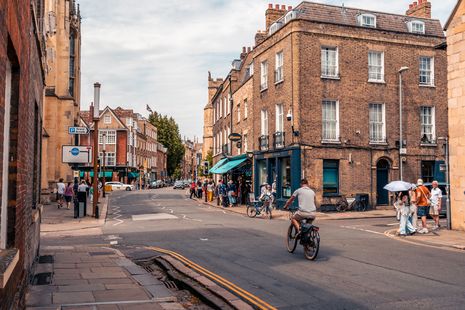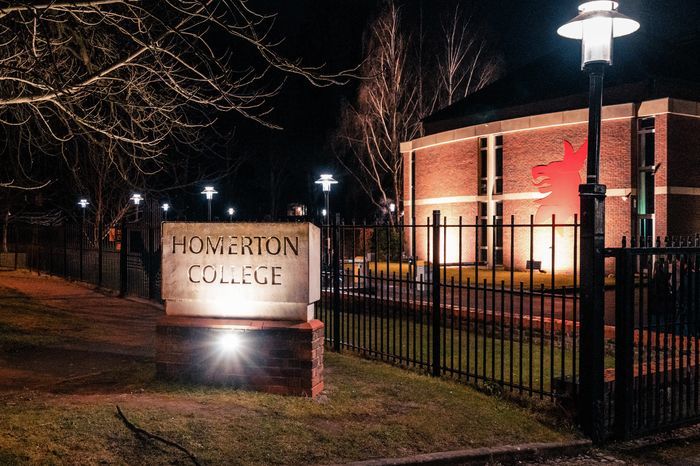A fleshy realisation
Jasper Finlay Burnside, as a consequence of a bizarre experience on the way to the station, argues on behalf of Cambridge’s, and the rest of the country’s, cycling infrastructure

Yesterday morning, while driving to the train station, I was affronted. I was neither mugged nor robbed, but mooned. As I rounded the bend on a perilous country road, the full face of a cyclist’s bottom revealed itself to me. As I gazed at his chasm, contemplating my life choices, a thought flashed into my head: Why is cycling infrastructure so bad in Britain? It was a moment of shocking and profoundly fleshy clarity.
This idea is not new to me. Yet, even in Cambridge, it has never struck me so wholly. As boring as I am, after a recent event, I approached some acquaintances with my radical thoughts about the need for more cycling lanes. I was confronted with several arguments and many accusations, two of which linger. For my wish to expand cycling routes, I was deemed a CCP shill and, simultaneously, an enemy of the working class. The mental gymnastics were perplexing, yet what seemed more striking was this rare show of unity from two friends who would normally disagree about the colour of the sky. The strange emotional rationality were bizarre and seemed at odds with the banality of the subject matter; namely, a piece of pavement.
“For my wish to expand cycling routes, I was deemed a CCP shill and, simultaneously, an enemy of the working class”
During our discussion, the argument that our towns and cities are not designed for cycling was raised as a trump card. I have nothing but contempt for such a defeatist argument. Of course, our towns and cities aren’t designed with cyclists in mind. They were designed for horses, then adapted for trams, and later retrofitted for cars with a level of brute force that helped level communities. That is precisely why we must change them. Nothing will change if we remain tied to the idea that the status quo, accepting that urban planning in this country is permanently tied to the car, as the only option. Even in Cambridge, which has some marginally better infrastructure than the rest of the country, we still languish in a primordial mist when compared to our continental counterparts in Denmark or the Netherlands, who recognise that the idea of a 15-minute city is not an attempted authoritarian insurrection.
I can already hear the chuntering from motorists. Doubtless, claims that I am advocating for a war on cars will be brandished by those of all political stripes. This is predictable, banal bile. People still need cars, particularly since none of this can happen overnight in a country with such dire infrastructure. This attempt to increase the safety of cyclists, and incidentally, other road users, will not destroy the car. Rather, it will give people better options and healthier ways to get around, dismantling our impossible dependency on the car for even minor errands. If you remain unconvinced and adamant that my dreams of cycle lanes are an authoritarian attempt to destroy driving, then I have to share an embarrassing fact. I cannot cycle. After being thoroughly traumatised in my attempts to learn, I gave up. Awkward as it might be, I need a car to travel long distances, which is why I have developed, much to the loathing of my shorter friends, a fearsome power walk. My argument is not based on self-interest, except for maybe a less rotund drive to the train station.
"It seems strange that we have forgotten about our communities, our homes, and the places where we live"
This is not about reaching some Dutch utopia; it is about making all our lives somewhat better by improving transportation and access. The benefits of cycling are so strikingly obvious. Better cycling infrastructure improves our mental and physical health, and rather counterintuitively, might help to decongest some of our most congested roads. You might think that I am bohemian, dreaming of a utopia or dystopia, depending on your perspective. Fundamentally, it is not a folly or some impossible dream. After the Second World War, with much of the Netherlands destroyed by intensifying fighting and bombing campaigns, they decided to redesign their cities, constructing a cycling culture which took decades to complete. This was a feat of political will, not a happy accident.
While our politics is in turmoil, it seems strange that we have forgotten about our communities, our homes, and the places where we live. I want to live in a place where people can choose to cycle. Somewhere, cars aren’t needed for a short journey. Somewhere, kids can bike to school without the fear of getting hit by a lunatic breaking the speed limit. These are not radical dreams, or at least they shouldn’t be. We can make our communities nicer places to live and to be. Places where cycling is not dangerous because of cars, but is safe because of good design. Making our towns better places to live isn’t just about roads or health; it’s about building a sense of community. The solution is simple. Build a bike lane. For the sake of our futures, our towns, and my eyes, we need them.
 News / Colleges charge different rents for the same Castle Street accommodation2 March 2026
News / Colleges charge different rents for the same Castle Street accommodation2 March 2026 News / News in Brief: waterworks, wine woes, and workplace wins 1 March 2026
News / News in Brief: waterworks, wine woes, and workplace wins 1 March 2026 News / Climate activists protest for ‘ethical careers policy’1 March 2026
News / Climate activists protest for ‘ethical careers policy’1 March 2026 News / Angela Merkel among Cambridge honorary degree nominees27 February 2026
News / Angela Merkel among Cambridge honorary degree nominees27 February 2026 News / Private school teacher who lied about Cambridge degree barred from teaching27 February 2026
News / Private school teacher who lied about Cambridge degree barred from teaching27 February 2026









